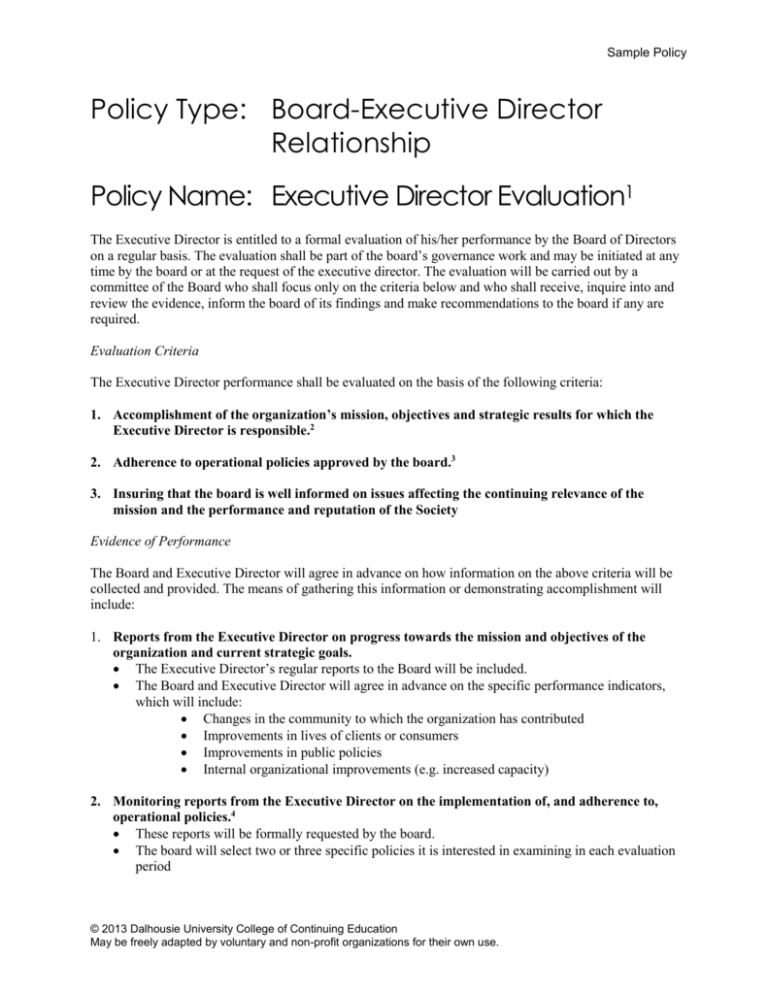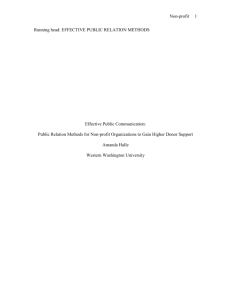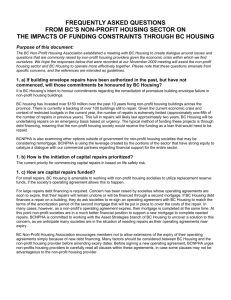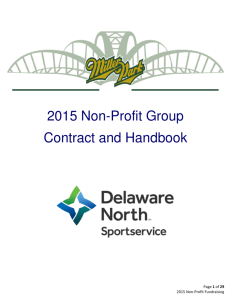Executive director evaluation
advertisement

Sample Policy Policy Type: Board-Executive Director Relationship Policy Name: Executive Director Evaluation1 The Executive Director is entitled to a formal evaluation of his/her performance by the Board of Directors on a regular basis. The evaluation shall be part of the board’s governance work and may be initiated at any time by the board or at the request of the executive director. The evaluation will be carried out by a committee of the Board who shall focus only on the criteria below and who shall receive, inquire into and review the evidence, inform the board of its findings and make recommendations to the board if any are required. Evaluation Criteria The Executive Director performance shall be evaluated on the basis of the following criteria: 1. Accomplishment of the organization’s mission, objectives and strategic results for which the Executive Director is responsible.2 2. Adherence to operational policies approved by the board.3 3. Insuring that the board is well informed on issues affecting the continuing relevance of the mission and the performance and reputation of the Society Evidence of Performance The Board and Executive Director will agree in advance on how information on the above criteria will be collected and provided. The means of gathering this information or demonstrating accomplishment will include: 1. Reports from the Executive Director on progress towards the mission and objectives of the organization and current strategic goals. The Executive Director’s regular reports to the Board will be included. The Board and Executive Director will agree in advance on the specific performance indicators, which will include: Changes in the community to which the organization has contributed Improvements in lives of clients or consumers Improvements in public policies Internal organizational improvements (e.g. increased capacity) 2. Monitoring reports from the Executive Director on the implementation of, and adherence to, operational policies.4 These reports will be formally requested by the board. The board will select two or three specific policies it is interested in examining in each evaluation period © 2013 Dalhousie University College of Continuing Education May be freely adapted by voluntary and non-profit organizations for their own use. Sample Policy 3. Independent verification and other data gathered by the Committee in relation to the implementation of operational policies. The Committee may want to interview selected clients, staff, key stakeholders, funders and suppliers and inspect specific records.5 Regular client or customer feedback mechanisms (e.g. satisfaction surveys) are valuable as management and governance tools, as well as being employed in the evaluation of the executive director. An annual audit of the Society’s financial records and any advice solicited or received from the auditors will be part of the ED evaluation process. In seeking independent verification of executive director performance the Committee, and other members of the Board, will not to seek information outside of the process described here.6 Findings and Recommendations The committee will report to the board the results of their assessment and may make a recommendation regarding actions required including adjustments in the salary or other conditions of employment of the executive director. The Committee’s report will be communicated to the executive director for comment before it is sent to the board. The committee’s report shall also outline the evaluation process in terms of what evidence was reviewed and who was interviewed and may include recommendations to improve the policy or its future application. The Committee’s findings may include a judgment, based on the evaluation criteria and the evidence examined, whether the executive director’s performance is excellent, very good, satisfactory, poor or unacceptable. Except where this performance is judged as excellent, areas for improvement should be identified. Recommendations, if any, for an adjustment in salary or conditions of employment shall take into account the standards or levels in comparable organizations.7 <Date Approved> 1 This sample policy reflects an approach to executive director evaluation that is consistent with the principles of John Carver’s Policy Governance Model. As such it is most appropriate for non-profit organizations that rely on a single executive director or CEO. There are alternative models of evaluation. Of all board policies, this is the one that probably requires the most board-executive director negotiation. Indeed, the policy ought to be part of the terms and conditions of employment and should be brought “to the table” whenever a board is about to hire a new executive director. 2 The executive director may share responsibility with the board for some aspects of organizational performance. 3 The key ones likely are, or fall under, the personnel policy or the financial management policy. There may be other policies that deal with client services, public relations, and fundraising, etc. 4 The executive director will be expected to bring to the board a report describing and documenting the application of a particular policy or a portion of a policy. For example, a board may want, in one evaluation period, to examine how well the organization has met the board’s requirement, in the personnel policy, that the organization hire on the basis of merit. The ED would then be expected produce a “monitoring report” or description of how new employees hired that year were recruited, interviewed and assessed, as well as copies of job advertisements, interviewing team membership, interview questions and evaluation matrix. 5 The Committee may only want, in any single evaluation exercise, to interview a handful of individuals. 6 This sentence basically says that the Board will not go “behind the executive director’s back” in seeking evidence of his/her performance 7 If there is not already a salary matrix with steps for the executive director’s position based upon an investigation of “industry” practices then the evaluation committee may have to do additional work determining what the range and steps should be. Non-profit organizations often have to consider benefits other than salary to make the ED’s job attractive. © 2013 Dalhousie University College of Continuing Education May be freely adapted by voluntary and non-profit organizations for their own use.
















